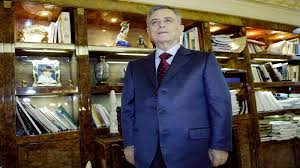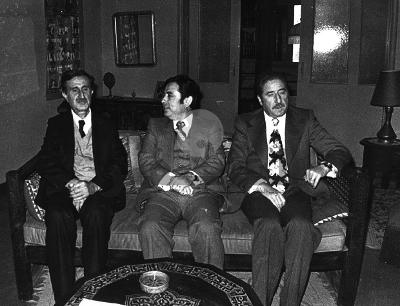Former Syrian Vice President Abdel Halim Khaddam has sent a message to the Syrian people, emphasizing his commitment to frankness and clarity due to the grave danger faced by the nation and its people. This danger is posed by the ruling regime led by the serial killer Bashar Al-Assad, with support from Iran and Russia, while the Arab position remains weak and the international stance reluctant.
Khaddam explained that when a people face external or internal aggression, they must unite their ranks, mobilize their energies, and set aside personal ambitions and aspirations. The common goal should be the overthrow of the deadly regime and holding accountable those responsible for crimes such as murder, extermination, displacement, and humiliation. However, the current situation in Syria is different, characterized by divisions, blocs, contradictions, and differences, all while Bashar Al-Assad continues his crimes. Khaddam expressed concern about the extension of these divisions even among revolution fighters and military members.
Regarding the Geneva conference, Khaddam highlighted its significance in both international and Syrian arenas. However, he criticized the lack of clarity regarding the conference’s objectives and the failure to consider the nature of aggression against the Syrian people. He pointed out that Russia, as a partner and protector of the deadly regime, has an unsurprising role in the conference, while the United States appears content with mere statements without taking practical and serious measures to save the Syrian people. Additionally, the participating countries, bodies, and organizations have not been specified.
Khaddam further mentioned leaked information about the coalition’s approval to participate in the Geneva conference. However, he expressed his concern about the confusion evident in statements made by several coalition members on the “Al Arabiyah” channel. One member declared the coalition’s readiness to negotiate with Farouq Al-Sharia, overlooking the fact that the law holds no authority compared to the tyrant Bashar Al-Assad. This member also failed to recognize the crucial objective of changing the structure of the armed forces and security services that have been responsible for acts of murder and destruction. The continuation of these two institutions, while the regime’s supporters retain control over state institutions, would pave the way for Bashar Al-Assad’s return to power through elections held by the transitional government, amidst the harsh conditions suffered by the Syrian people.
In conclusion, Khaddam emphasized the importance of addressing the urgent national necessity by holding a national conference. This conference would not only save the Syrian people but also assess the current situation, including the Geneva conference. It should assume its responsibility to accept or reject the conference’s outcomes, ensuring that isolation does not lead to further distressing circumstances. Khaddam urged recognition of the united front formed by the regime and its supporters, while the forces of the revolution remain dispersed and divided.
He added, “The stated goal of forming a transitional government, in which Bashar Al-Assad will not be the decision-maker but his representatives, would render the situation bad and dangerous. The formation of this government and its subsequent division due to differences may potentially lead to an international decision to divide Syria, akin to what transpired in the question of Palestine in the late 1940s.”
He pointed out that another member stipulated participation in the Geneva conference with the intention of building bridges of trust between the opposition and the regime. He expressed surprise at such a statement, questioning how trust could be fostered between a murderous regime that has killed hundreds of thousands of Syrians, displaced and humiliated them, and destroyed their villages and cities. Throughout history, no bridges of trust have been built between a genocidal regime and a suffering people. He also mentioned a third member who required the support of Arab and Islamic countries to participate in the Geneva conference, prompting him to inquire about the capabilities of these countries to fulfill their guarantee.
In his letter, Khaddam expressed hope that the coalition would not act under the assumption that it represents and leads the people, citing two reasons for this: first, the coalition lacks the capacity to shoulder such responsibility, and second, the prevailing reality on the ground. He warned that any action undertaken in the name of the Syrian people would only exacerbate divisions within the country and fortify the deadly regime. Representation can arise from two sources: either through popular elections or by convening a national conference that includes representatives from all the different military organizations, political forces, and competent and knowledgeable individuals in Syria.
He believed that holding this conference had become an urgent national necessity, serving two purposes: to save the Syrian people and to thoroughly analyze the current situation, including the matter of the Geneva conference. The responsibility of the conference should be to accept or reject its outcomes, ensuring that isolation does not result in dire and painful conditions. Khaddam emphasized the need to recognize the united front formed by the regime and its supporters who are perpetrating crimes, while the revolutionary forces remain dispersed and dismantled.
He believed that the unity of Syrians is the only way to confront the dangerous situation and the hidden struggles being waged against Syria.



